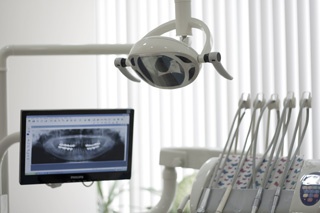Understanding X-Rays
 X-rays are one of the most important diagnostic tools at any dentist’s office. Getting your regular x-rays is the only way to be sure that you don’t have any tooth decay that needs to be taken care of.
X-rays are one of the most important diagnostic tools at any dentist’s office. Getting your regular x-rays is the only way to be sure that you don’t have any tooth decay that needs to be taken care of.
But, considering the dangers of radiation, are x-rays a worthwhile risk? This is a common concern, so Overlake Dental in Bellevue wants our patients have the important facts they need to feel safe during their normal dental appointments.
“X-rays, also known as radiographs, are an essential part of any dental care treatment plan. They are diagnostic, but they can also be preventative, by helping a dentist diagnose potential oral care issues in a patient’s mouth before they become a major problem. An x-ray is a type of energy that passes through soft tissues and is absorbed by dense tissue. Teeth and bone are very dense, so they absorb X-rays, while X-rays pass more easily through gums and cheeks.
X-rays are divided into two main categories, intraoral and extraoral. Intraoral is an X-ray that is taken inside the mouth. An extraoral X-ray is taken outside of the mouth.
Intraoral X-rays are the most common type of radiograph taken in dentistry. They give a high level of detail of the tooth, bone and supporting tissues of the mouth.”
– Colgate
The first thing to realize is that the amount of radiation you are subjected to with modern dental x-ray machines is exceptionally minimal. Advances in x-ray technology allow us to get an effective image of your teeth quickly and efficiently.
Machines operating at a higher speed let us capture a picture with a very short exposure period, and more limited x-ray beams focus the radiation only on where it is needed. Along with the advances in dental technology, you also enjoy the protection lead-lined aprons.
In short, the small amount of radiation that you are exposed to is easily worth the benefits you get from an occasional dental x-ray.
